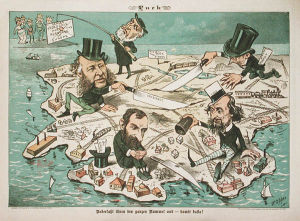Difference between revisions of "Monopoly"
(→How it works) |
m |
||
| (6 intermediate revisions by 2 users not shown) | |||
| Line 6: | Line 6: | ||
====How it works==== | ====How it works==== | ||
| − | Monopoly's usually occur when a business or individual acquires a new resource that is in high demand, oil, lumber, computer software. | + | Monopoly's usually occur when a business or individual acquires a new resource that is in high demand, oil, lumber, computer software. In most cases, the monopolies have already been established before public opinion and government regulations can challenge them. After the Monopoly's have acquired a foot hold in the market place, they can continue their survival through buying out their competition. Usually, it takes an act of the government to bust up the monopoly's in order to create a more balanced and competitive market. |
====Evidence==== | ====Evidence==== | ||
| + | The creation and establishment of the Sherman Anti-Trust Law by the United States Congress in 1890 was a direct response to the corporate monopolization of the market place. Section 2 of that law specificity outlaws monopoly's within the United States. This law has been used to bust up the monopoly of Standard Oil in 1911 into 33 different companies. Before that John D Rockefeller, the chairman of Standard Oil, had aggressively gone after and destroyed the competition to maintain the monopoly of Standard Oil. | ||
==== Links ==== | ==== Links ==== | ||
| − | [[ | + | [[Corruption and Fraud]], [[Media Monopolies]], [[Cultural imperialism]], [[Social Darwinism]] |
| − | ==== | + | ==== References ==== |
| + | |||
| + | <references/> | ||
Latest revision as of 16:50, 26 February 2014
Description
Monopolies (both actual and defacto) exist when one institution controls the access to something else, generally a commodity, information, or a service. In the absence of external controls, the institution can (and almost inevitably does) then set the price, determine the attributes of what they’re selling, and, even, who’s eligible to acquire what’s being sold. The key to the idea is control. A monopoly that is actually being regulated does not have the power that an unregulated one has, a power that is generally misused.
How it works
Monopoly's usually occur when a business or individual acquires a new resource that is in high demand, oil, lumber, computer software. In most cases, the monopolies have already been established before public opinion and government regulations can challenge them. After the Monopoly's have acquired a foot hold in the market place, they can continue their survival through buying out their competition. Usually, it takes an act of the government to bust up the monopoly's in order to create a more balanced and competitive market.
Evidence
The creation and establishment of the Sherman Anti-Trust Law by the United States Congress in 1890 was a direct response to the corporate monopolization of the market place. Section 2 of that law specificity outlaws monopoly's within the United States. This law has been used to bust up the monopoly of Standard Oil in 1911 into 33 different companies. Before that John D Rockefeller, the chairman of Standard Oil, had aggressively gone after and destroyed the competition to maintain the monopoly of Standard Oil.
Links
Corruption and Fraud, Media Monopolies, Cultural imperialism, Social Darwinism

